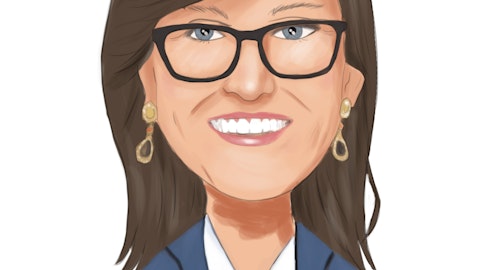In this article, we list the 5 biggest pharmaceutical companies in the world. If you want to read about our detailed analysis of these pharmaceutical companies, go directly to the 25 Biggest Pharmaceutical Companies in the World.
5. Novo Nordisk A/S (NYSE: NVO)
Market Capitalization as of September 11, 2021: $228.5 billion
Market Capitalization as of September 02, 2022: $236.4 billion
Novo Nordisk A/S (CPH: NVO) has been providing impeccable solutions to serious chronic diseases such as obesity, diabetes, and rare blood and endocrine diseases for over 100 years. The innovative medicines and digital health tools developed by Novo Nordisk A/S (CPH: NVO) such as insulin pens that benefit millions of people all around the world. Not only this, Novo Nordisk A/S (CPH: NVO) attempts to provide easy access to these medicines and tools to everyone in need around the globe. Novo Nordisk A/S (CPH: NVO) is ranked 6th on the list of 25 biggest pharmaceutical companies in the world.
In the Q2 2021 investor letter of LRT Capital Management, the fund mentioned Novo Nordisk A/S (NYSE: NVO). Here is what the fund said:
“Novo Nordisk is the global leader in insulin, which is, sadly, a growing business as more and more people around the world suffer from diabetes. Millions of people need daily injections of insulin to stay alive50, a number that, unfortunately, is likely to continue to grow by millions more in the coming decade. It may seem at first glance that insulin should be a commoditized business, after all, it was discovered and synthesized over a hundred years ago, but nothing could be further from the truth. There are many types of insulin and Novo Nordisk has spent billions on R&D over the years to develop new products. On February 11th, the company reported favorable results from a phase-3 trial of Semaglutide, a drug that is currently used for Type 2 diabetes treatment. The study evaluated the use of Semaglutide for weight loss treatment in non-diabetic patients and found a significant impact on weight loss for patients receiving Semaglutide vs. the placebo control group. If Semaglutide is approved for weight loss treatment, we expect it will be meaningfully accretive to the company’s bottom line.
The company’s proprietary product line supports returns on invested capital of over 40%, and while sales growth is relatively slow (+6% annualized CAGR over the past decade), the company’s shares trade at a reasonable valuation of only 22x forward earnings. For a company with an extremely predictable business, high returns on capital, and an easily forecastable future, we believe this to be highly attractive.
Shares are +34.43% year-to-date and +40.92% over the past twelve months.”





